Sunday, Jan. 2, 2011 | 2 a.m.
Sun Topics
Sun Coverage
Sun archives
- UNLV’s Brown thinks Las Vegas is in housing recovery (10-22-2010)
- Housing analyst: Short sales hurting economic recovery (10-8-2010)
- Excess housing threatens economic recovery in LV (6-25-2010)
- Real estate expert sees recovery in LV market (5-14-2010)
- Housing recovery at least a year away, analysts say (1-21-2010)
- Experts: Foreclosures threaten possible Las Vegas housing recovery (7-17-2009)
Las Vegas has been stricken by an unfathomable number of home foreclosures. Most of the surviving homeowners owe more on their homes than they’re worth in today’s marketplace. Young families that thought they were buying homes on the cheap two or three years ago are now finding that they, too, are underwater.
On the other hand, this is all good news for buyers looking for incredible deals.
What’s in store for us in 2011?
The Sun on Dec. 22 gathered four real estate and housing experts to talk about what’s next.
Not surprisingly, they didn’t agree.
Joining us for a Sunday conversation were Dennis Smith, president of Home Builders Research; Steve Bottfeld, executive vice president of Marketing Solutions; Richard Plaster, founder of Signature Homes, and Mark Stark, owner of Prudential Americana real estate brokerage.
What are we looking at with sales of existing homes in 2011? Will they match 2010 or be greater?
Dennis Smith: Anyone who thinks there’s going to be an increase in sales, I don’t know how that’s going to happen. We are not going to get any more artificial stimulus from the federal government.
Richard Plaster: Or stimulus from lower interest rates.
Smith: What I have read suggests interest rates are only going to go in one direction and that’s up. I haven’t seen or heard anything that says interest rates are going to go down. Whatever number we end up at this year (in 2010), put it in for next year, and I don’t think we will be off 5 percent one way or another in resales.
Mark Stark: The last four months of the year back up what you are saying. Units have already come down in 2010 versus 2009. You have already seen a reduction, and pretty dramatic reduction, in the last four months in closed resale units.
Does anybody see 2011 sales being higher?
Smith: It could happen if Fannie (Mae) and Freddie (Mac) release the inventory that they tell me they’re going to do and release 20,000 houses or 10,000 houses. Do I think it’s going to happen? No. I don’t think they have the staff to do it. If they release 5,000 houses, they could be sold in five or six months.
Plaster: If the number of units became greater, what would happen to the price level?
Smith: We are not at the prices, yet. We are still at the number.
Plaster: But they do interact.
Steve Bottfeld: That’s the point I wanted to get at. We had a $115,000 median price for all existing homes for the month of November. If you break it down by foreclosures and short sales, which was up around $125,000 and nondistressed properties were around $123,000. We are looking at short sales maybe pushing up prices, but the key here is that Las Vegas is the lowest-priced major market in the United States. Ask yourself this question: If I’m an investor, where am I going to put my money and how long will it take Las Vegas to come back?
Does that mean you think sales and prices will increase in 2011?
Bottfeld: No. What it means there is the potential for prices to increase. I think sales will remain where we are at now.
Smith: I don’t think (prices are) going to go down much lower on the resale end. On the new-home segment if we are comparing year-to-year prices — I said it earlier this year and I got criticized for it — I think we will see another small increase in the price of new-home sales.
Stark: I put no change for 2011 when I put my budget in to Prudential.
Plaster: I’m more pessimistic. People ask if this is a good time to buy a house and in retrospect probably four months ago was because what has happened with affordability in terms of interest rates — up about three-quarters of a point from the bottom. That’s going to be a strong headwind. I don’t know what percentage of sales are cash, but there’s only so much cash out there.
Stark: Forty-six percent were cash sales.
Plaster: I am one of those buyers. I buy them to flip, but we also have some we buy for investment purposes. It sounds great getting a 10 to 12 percent return, but if the value of your price has fallen 5 percent, all that return for that year has disappeared, so what you are having to bet on is when will the prices come up. I fervently believe that prices are now below our stabilized level by an order of magnitude of 20 percent. But I have to say if I have to choose if we were to meet at this time next year, my sense is the price level has a greater chance of being lower than higher in Las Vegas.
Are foreclosures going to continue at the same level in 2011?
Smith: The foreclosures in 2011, according to what they’re hoping for, is that there will be an increased level of inventory of distressed properties. As for short sales, I still have my doubts on them. I know they have improved, but improved from what? Nothing.
Bottfeld: But that doesn’t happen in all cases.
Dennis: The key here is that next year is going to be a short sale year and not a foreclosure year. For the first time, we are going to see more short sales in 2011 than we will see foreclosures.
Smith: How many short sales turn into foreclosures?
Bottfeld: That’s a good question. I don’t think anybody has an answer for it. But the issue becomes, I think, banks have finally figured out that they make a heck of a lot more money on a short sale.
Smith: You are giving the banks a lot more credit than a lot of people do.
Stark: Here’s the problem with that. There’s so much behind the scenes. We’re doing successful short sales and the majority of those worked out where it was clearly in the benefit of the consumer. You’ve got to remember that being broke is a powerful thing. You want to have power? Have no money. They say, “Go ahead, come after me.” They have a lot of power. (Laughter.) You have got people who look and say, “This is the deal. You can come back at me. I am just trying to do it the right way. I’m a good person, but I am not going to do something that makes no financial sense for me and bind myself for the next six years.”
Plaster: You have hit something there that we should take in. You know that a huge proportion of people are underwater with their houses in Las Vegas. It’s a learning curve and unless they convince themselves that there’s going to be a bounce of some price level at some predictable time, more and more of these people are going to say, “I am just working for the bank,” and they are going to walk. The strategic default hasn’t happened that much, but the longer this goes on with the price level not changing, these people don’t care.
Bottfeld: You all have a great point, but I am going to stay with my one thought — you have 915 foreclosures in November and you’re going to have about 1,000 foreclosures in December ... We have been running between 20,000 to 25,000 foreclosures over the last two to three years, we are looking at somewhere between 65,000 and 75,000 foreclosures over that three-year period. I think 2011 is going to be the first year we don’t break 20,000 foreclosures. We will do less.
When are going to get back to that point where we are selling 38,000 new homes and 55,000 existing homes?
Smith: We will be dead before then. (Laughter.)
Bottfeld: You can tell my gravestone.
Plaster: I don’t think it will be in our lifetime.
Bottfeld: I agree with Dennis and Richard. The days of 2005, 2006 and 2007 are gone. One thing that has been done recently will improve the situation but it will take some time. In 2001, the Bush administration eliminated (Securities and Exchange Commission) oversight on mortgage-backed securities. The Obama administration has put SEC oversight back over mortgage-backed securities. That means we can’t have — we shouldn’t have — another subprime debacle. We are going to be in a much more sane economic environment in terms of the potential for growth over the next two years than we have been over the past three.
Plaster: I can disagree. To my mind, the question marks are bigger than they have ever been. You say 50 percent of the inventory is Fannie and Freddie. But of new loans, the government is closer to 95 percent. A lot of those are bad loans, and it’s costing the federal Treasury. Mortgage-backed securities have gone bye. The banks have gone bye. So it’s the government now. What is the government going to do? Do you think there is going to be increased involvement by the government in the mortgage business? Hey, the Republicans won. They are against that stuff. I’m a good Democrat. I say give them some loans, but they are doing some bad underwriting right now and on the new homes, and they are going to take some losses that are going to show up really fast.
When is the housing market going to be considered healthy or in recovery?
Smith: What’s your definition of recovery?
Plaster: Let’s come up with something. Let’s say a 10 percent increase in the price level with the trend going that direction.
Smith: Will prices start to go up? Sure they will, but will the gap (between new and existing homes) close?
Bottfeld: There was a point there where new homes were way over.
Plaster: Pick a number.
Smith: Given the circumstances that we have today and assuming it will continue into the near term, when will the prices start to show an increasing trend? My best guess is we talk about both or in a combination — a minimum of three years.
What is the key?
Stark: For Vegas, it all comes back to what Richard said: We need jobs. If we start focusing on the jobs, I am not worried about two years, three years or four years. It will be healthy through that process. If we don’t start hiring people, be it through diversification, be it through the rest of the country gets healthier quicker, we’re certainly not going to be the healthier one sooner. But if they are, people will start spending money. Vegas is cheap now, and that’s what made us great.
Plaster: We are all making bets. I made a real bet. I was a homebuilder. I vowed I was not going to be building any houses in this market. I could change my mind tomorrow if somebody comes through. (Laughter.) Right now, I am not building houses. I don’t think there’s a need for additional housing in this market. The job thing. My sense is it’s going to come back very slowly through our primary industry. The best piece of news was when these damn shoe people (Zappos) took over the old City Hall in downtown Las Vegas. That was a great story, and that’s a great company. We need more of that.
Bottfeld: I think we have missed two points. The first point is that the Vegas reputation has been sullied, and I don’t think we have done nearly enough as a community to protect ourselves. We need to a create a committee that fights the idiotic stories that come out about Vegas. For example we have the highest crime rate. R&R (Partners) did a great job of building a brand that we’re not protecting. That is No. 1. The second thing that has to happen is we have to give the Nevada Development Authority more tools. Arnold Schwarzenegger came to Vegas and said, “I’m bringing back all of those jobs.” He went home in an empty truck. We need to be able to bring more diversified employment centers in. A Pepsi-Cola bottling plant isn’t enough, boys and girls. Symphony Park, when it gets going, still isn’t enough, but it’s a step in the right direction.
Is it possible that instead of jobs, that retirees, because of the affordable prices, will move here in large numbers to help the housing market and economy?
Plaster: I have wondered about that. My sense is that the past decade was a mistake. If you go back 10 years, Vegas was very attractive to retire in, and we were beginning to see a little bit of diversification with companies coming in because they could move here and their employees could afford to buy houses, typically coming out of California. I think we’re coming back to that stage, but the problem is the economy we are facing right now in the U.S. is stagnant. We’re not able to do it. The retirees are locked back in their house wherever. They are not underwater like most people in this town, but they felt pain. I’m also concerned. It happened after the Depression, and I think it’s happening after the Great Recession — that people aren’t as positive in their outlook and that makes them more hesitant to do anything.
Bottfeld: Let me build on his point. The Baby Boomer generation turns 65 this year. There’s no question that the older age groups are the fastest-growing population groups in the economy. We’re not building to that. We’re not communicating to that. We’re not advertising to that. We’re not describing that in any of the communications that are going out from this community. It’s one of those things that I think is really important.

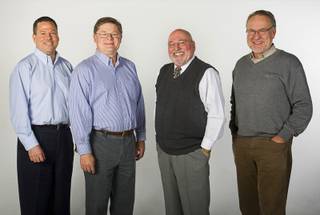
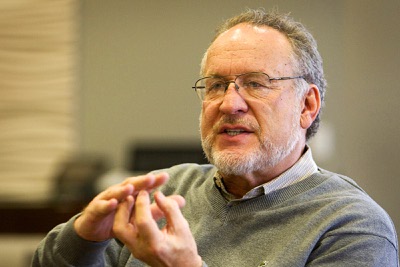
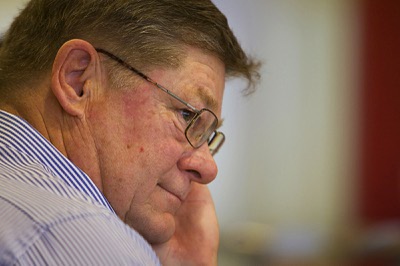
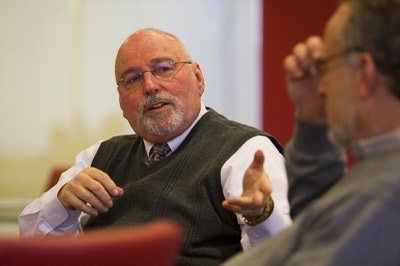
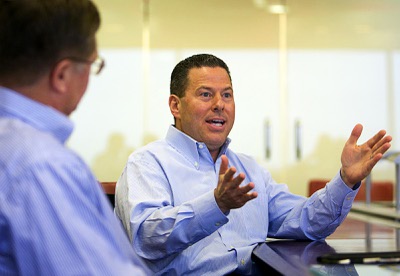

Join the Discussion:
Check this out for a full explanation of our conversion to the LiveFyre commenting system and instructions on how to sign up for an account.
Full comments policy